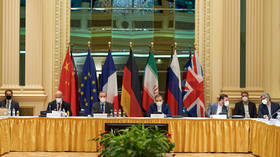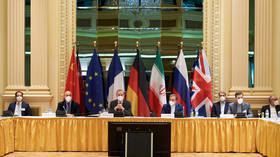Iran drops nuclear deal demand — CNN

Iran has dropped its demand that Washington remove the Islamic Revolutionary Guard Corps (IRGC) from the US terror blacklist, CNN reported on Friday, citing an unnamed senior US official. The issue has so far been a major stumbling block in talks to salvage the landmark 2015 nuclear deal with Tehran.
According to the news network’s source, Iran did not include such a demand in its response to the “final” text of the agreement, proposed by the EU on August 8, to revive the nuclear deal. "The current version of the text, and what they are demanding, drops it," the official told CNN. "So if we are closer to a deal, that's why."
The official also indicated that Iran walked back on its demands to delist several companies with ties to the IRGC, the country’s elite military unit.
The Biden administration has been adamant that it will not lift sanctions on the IRGC. Earlier, high-profile US lawmakers and officials from both sides spoke against any efforts to drop the restrictions placed on the military unit.
The designation was made in 2019 under former President Donald Trump, and marked the first time the US had labelled a part of another government as a Foreign Terrorist Organization (FTO).
CNN's source said that while reviving the Iran nuclear deal now seems “closer than it was two weeks ago, the outcome remains uncertain” as the sides have to reach an agreement on a number of other points.
Those include Iran’s reported insistence that the US should pay a fine if it unilaterally withdraws from the deal again, and the demand that the International Atomic Energy Agency (IAEA) should drop its investigation into Tehran’s nuclear program.
According to another CNN source, progress in the negotiations could be somewhat slower from this point onwards.
Earlier, Mikhail Ulyanov, Russia’s representative at the negotiations, said that while talks on resuscitating the nuclear deal are drawing to an end, even the last few sentences may prove to be a stumbling block.
Last week, Politico reported that the EU was proposing to dilute US sanctions on the IRGC by allowing non-American entities, including Europeans, to do business with Iranians involved in “transactions” with the IRGC in a way that would not trigger US sanctions. This move, if agreed upon, would mean that the EU could trade with Iran almost unimpeded.
The IRGC was founded after Iran’s 1979 Islamic revolution. The Corps is tasked with protecting the values of the Revolution, along with national security in its broadest meaning. The IRGC has its own land, naval, air, and missile forces. It also has its own special elite-within-elite, the Quds force – an expeditionary branch tasked with operations abroad and unconventional warfare.
The initial nuclear deal signed in 2015 by Iran, the US, UK, France, and Germany – as well as Russia, China, and the EU – involved Tehran agreeing to certain restrictions on its nuclear industry in exchange for the easing of economic sanctions and other incentives.
In 2018, however, it was torpedoed by the US under then-President Donald Trump, who unilaterally withdrew from the agreement, saying it was fundamentally flawed. As a result, Iran started gradually reducing some of its commitments under the accord, such as the level of enriched uranium it produces, which could potentially enable Tehran to build an atomic bomb. According to the Iranian authorities, however, this “is not on the agenda.”













